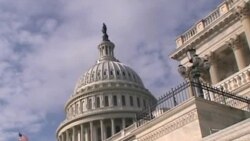WASHINGTON —
The coming days likely will bring extensive commentary from Capitol Hill on the latest round of international negotiations over Iran’s nuclear program. U.S. lawmakers are expected to weigh in on the need for continued sanctions against Iran, and the conditions Tehran would have to meet for those sanctions to be weakened or lifted.
The failure of talks in Geneva to yield an accord is not likely to be a focal point of discussion on Capitol Hill. Rather, it is the fact that, until the very end, those talks seemed to be generating some glimmers of hope for an eventual negotiated settlement over Iran’s long-disputed nuclear program. U.S. lawmakers of both political parties have voted repeatedly to tighten sanctions against Tehran, and show little appetite to reverse course.
Just a few weeks ago, Republican Senator Marco Rubio had this to say about Iran’s negotiating posture.
“This plan they have is clear as day," he said. "They are trying to figure out if they can get these sanctions suspended or lifted without giving up too much. And then at some point in the future, when the world has moved on, when we are focused on other things, they can make their move to build their bomb. Sanctions on Iran should not be lifted or suspended until they agree to completely abandon any capability for enrichment or reprocessing (of nuclear material).”
Democratic Senator Chris Coons made similar comments earlier this year.
“While diplomacy is the preferred outcome, I am distressed by what seem to be endless cycles of negotiations," Coons said. "And so, in my view, we need to be unrelenting in imposing tougher and tougher sanctions, and in being willing to use force in order to prevent the acquisition of a nuclear weapons capability by Iran.”
Sunday, U.S. Secretary of State John Kerry said “no deal is better than a bad deal” with Tehran. Meanwhile, Iranian President Hassan Rouhani said international sanctions will fail and Iran has the right to enrich uranium.
On domestic matters, U.S. lawmakers will continue work on a bipartisan budget deal. Without an agreement, the United States risks another partial government shutdown in January.
Also this week, the United States honors its military veterans. President Obama will mark the Veteran's Day holiday Monday with a visit to Arlington National Cemetery.
The failure of talks in Geneva to yield an accord is not likely to be a focal point of discussion on Capitol Hill. Rather, it is the fact that, until the very end, those talks seemed to be generating some glimmers of hope for an eventual negotiated settlement over Iran’s long-disputed nuclear program. U.S. lawmakers of both political parties have voted repeatedly to tighten sanctions against Tehran, and show little appetite to reverse course.
Just a few weeks ago, Republican Senator Marco Rubio had this to say about Iran’s negotiating posture.
“This plan they have is clear as day," he said. "They are trying to figure out if they can get these sanctions suspended or lifted without giving up too much. And then at some point in the future, when the world has moved on, when we are focused on other things, they can make their move to build their bomb. Sanctions on Iran should not be lifted or suspended until they agree to completely abandon any capability for enrichment or reprocessing (of nuclear material).”
Democratic Senator Chris Coons made similar comments earlier this year.
“While diplomacy is the preferred outcome, I am distressed by what seem to be endless cycles of negotiations," Coons said. "And so, in my view, we need to be unrelenting in imposing tougher and tougher sanctions, and in being willing to use force in order to prevent the acquisition of a nuclear weapons capability by Iran.”
Sunday, U.S. Secretary of State John Kerry said “no deal is better than a bad deal” with Tehran. Meanwhile, Iranian President Hassan Rouhani said international sanctions will fail and Iran has the right to enrich uranium.
On domestic matters, U.S. lawmakers will continue work on a bipartisan budget deal. Without an agreement, the United States risks another partial government shutdown in January.
Also this week, the United States honors its military veterans. President Obama will mark the Veteran's Day holiday Monday with a visit to Arlington National Cemetery.





